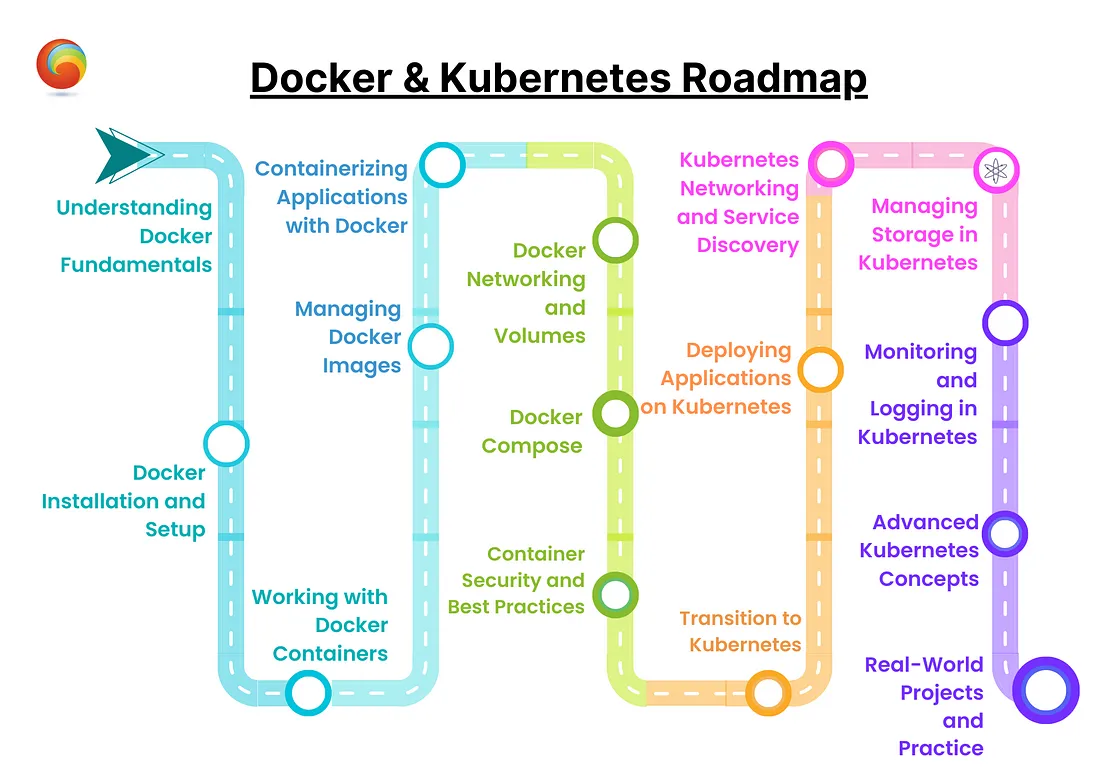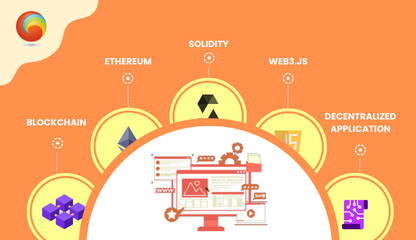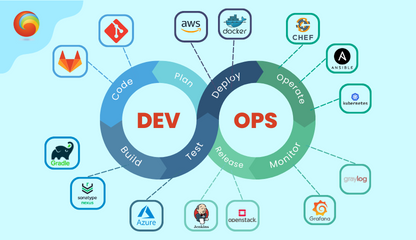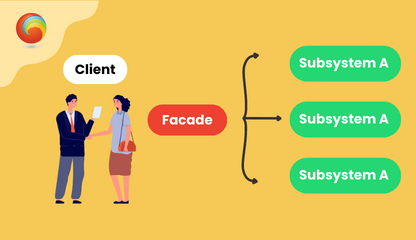Docker and Kubernetes Roadmap : containerization & orchestration.
In the ever-evolving landscape of software development and deployment, Docker and Kubernetes have emerged as the dynamic duo for containerization and orchestration. Docker enables efficient containerization, while Kubernetes empowers scalable and resilient application orchestration. To effectively navigate the world of Docker and Kubernetes and leverage their full potential, follow this comprehensive Docker and Kubernetes roadmap.
In this blog post, we present an in-depth roadmap that places equal emphasis on mastering Docker and Kubernetes.
By following this Docker and Kubernetes roadmap, you will gain proficiency in containerization with Docker and seamlessly transition to the world of Kubernetes orchestration.

Understanding Docker Fundamentals:
- Explore the core concepts of Docker, such as containers, images, Dockerfiles, and Docker Hub.
- Grasp the advantages of Docker, including portability, scalability, and reproducibility of applications.
Docker Installation and Setup:
- Install Docker on your machine or set up a Docker environment tailored to your operating system (Windows, macOS, or Linux).
- Familiarize yourself with the Docker CLI (Command-Line Interface) and essential commands for managing containers and images.
Working with Docker Containers:
- Learn to pull existing Docker images from Docker Hub and run containers based on those images.
- Master the creation of custom Docker images using Dockerfiles and best practices.
- Explore container lifecycle management, including starting, stopping, pausing, and removing containers.
- Gain insights into Docker networking and connecting containers together.
Managing Docker Images:
- Build Docker images from scratch using Dockerfiles, following best practices for image optimization and security.
- Understand the concept of container layers and their impact on image size and caching.
- Explore Docker image registries and repositories like Docker Hub, and learn techniques for tagging, pushing, pulling, and deleting Docker images.
Containerizing Applications with Docker:
- Containerize sample applications or your own projects using Docker.
- Understand the process of packaging dependencies, libraries, and configurations within a container.
- Optimize container size and performance by minimizing layers and utilizing multi-stage builds.
Docker Networking and Volumes:
- Gain proficiency in Docker networking models, exposing container ports to the host system, and setting up custom networks.
- Explore Docker volumes for persistent data storage and sharing data between containers.
Docker Compose:
- Dive into Docker Compose, a tool for defining and managing multi-container Docker applications.
- Learn to write Compose files that define services, networks, volumes, and dependencies between containers.
- Use Compose to orchestrate complex applications and simplify container deployment.
Container Security and Best Practices:
- Understand best practices for securing Docker containers, including image scanning, access control, and limiting container privileges.
- Explore container runtime security options and vulnerability management.
- Learn about Docker security tools and practices for monitoring and hardening container environments.
Transition to Kubernetes:
- Grasp the fundamentals of Kubernetes, its core components, and the architecture of a Kubernetes cluster.
- Install and set up a local Kubernetes cluster using tools like Minikube or kind.
- Understand how Kubernetes builds upon the concepts of Docker and extends containerization to container orchestration.
Deploying Applications on Kubernetes:
- Learn to create Kubernetes manifests using YAML files to define pods, deployments, services, and other resources.
- Deploy containerized applications on Kubernetes clusters, leveraging features like rolling updates and rollbacks.
- Scale resources manually and automatically using Kubernetes commands and techniques like horizontal pod autoscaling (HPA).
Kubernetes Networking and Service Discovery:
- Explore Kubernetes networking models, services, and service types for connecting and exposing applications.
- Utilize Kubernetes Ingress for advanced routing and external access to services.
- Learn about network policies for fine-grained control over traffic between pods.
Managing Storage in Kubernetes:
- Understand storage options in Kubernetes, including persistent volumes (PVs) and persistent volume claims (PVCs).
- Provision and manage storage resources for applications running on Kubernetes.
- Explore dynamic volume provisioning and storage classes for efficient utilization of storage resources.
Monitoring and Logging in Kubernetes:
- Implement monitoring and observability solutions for Kubernetes clusters using tools like Prometheus and Grafana.
- Set up centralized logging with tools like Elasticsearch, Fluentd, and Kibana (EFK stack) for collecting and analyzing logs from Kubernetes applications.
Advanced Kubernetes Concepts:
- Dive deeper into advanced Kubernetes concepts like stateful sets, daemon sets, jobs, cron jobs, and custom resource definitions (CRDs).
- Explore higher-level abstractions like Helm charts and Operators for streamlining application deployment and management.
Real-World Projects and Practice:
- Apply your knowledge to real-world projects that involve containerization with Docker and Kubernetes orchestration.
- Contribute to open-source projects or collaborate with the Docker and Kubernetes communities to gain practical experience and enhance your skills.
Mastering Docker and Kubernetes opens doors to scalable, efficient, and robust application deployment. By following this comprehensive Docker & Kubernetes roadmap, you will develop a solid foundation in Docker containerization and seamlessly transition to Kubernetes orchestration.
Embrace the power of Docker to create portable and reproducible containers, and then harness the scalability and flexibility of Kubernetes to orchestrate and manage your containerized applications.
Embark on this exciting journey, enhance your skills, and unlock the true potential of containerization and orchestration in modern software development and deployment.
Happy containerizing and orchestrating!
Frequently Asked Questions
-
Why use Docker and Kubernetes?
- Docker and Kubernetes are a dynamic duo in modern software development. Docker helps you create consistent and portable containers for your applications, making it easy to deploy them anywhere. Kubernetes, on the other hand, orchestrates these containers, ensuring they run efficiently, scale seamlessly, and stay highly available. Together, they streamline the entire software development and deployment process, making it faster and more reliable.
-
Is Kubernetes using Docker?
- Kubernetes can use Docker, but it's not limited to it. Kubernetes is container-agnostic, meaning it can manage containers created by various container runtimes, not just Docker. While Docker is one of the most popular container runtimes, Kubernetes can work with others like containerd and CRI-O.
-
What is the use of Docker?
- Docker is used to create and manage containers. Containers are like lightweight, isolated environments that contain everything needed to run an application, including the code, libraries, and dependencies. Docker simplifies application deployment and ensures that applications run consistently across different environments, from development to production.
-
What is Kubernetes used for?
- Kubernetes is used for container orchestration. It automates the deployment, scaling, and management of containerized applications. Kubernetes ensures that containers are distributed across clusters of machines, monitors their health, and replaces failed containers or scales them based on demand. It's ideal for managing complex, distributed applications in production environments.



